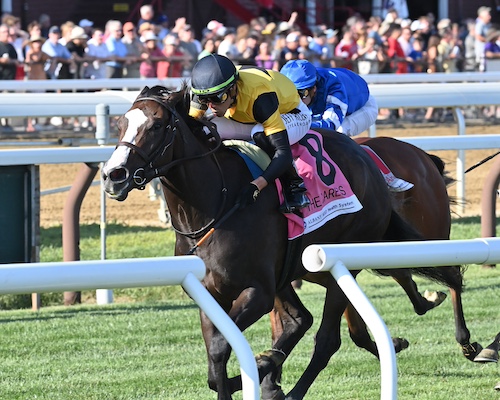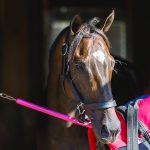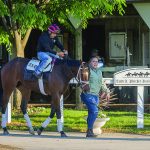Jonathan Sheppard termed it “amazing.” Arch Kingsley still gets goose bumps every time his eye catches Camden’s backstretch.
Saturday’s 40th Colonial Cup marks 10 years to the day when Ninepins, at the ripe age of 12, became the oldest winner ever of Camden’s signature race. No wonder he left such an indelible impression on his connections.
Ninepins descended upon Camden off a decisive 22-length romp over a strung out field in the Breeders’ Cup Grand National over Far Hills’ soggy turf course. Run over firm ground, 2 3/4 miles and Camden’s natural brush fences, the Colonial Cup would prove a much more daunting challenge. Summoning all the courage and guile that he could muster, Ninepins turned back novice champion Muscle Car and held off the late run of Campanile-two 5-year-olds-to post an improbable neck win in the Colonial Cup.
“He really had to dig deep that day to hold off a couple of nice horses,” Sheppard said. “To win that race as a 12-year-old and beat some of those younger in-form runners is simply amazing.”
Kingsley agreed.
“He won the Breeders’ Cup by 22 lengths but I think the Colonial Cup was the best race of all of them,” Kingsley said. “He hooked a really good horse in Muscle Car over the third-last, put that one away and then held off the big late charge of Campanile. To do all of that and still get the job done at 12 is pretty impressive. That’s something I dream about every time I look down that course. It just runs through my veins and is something I’ll always remember. Only the highest class of horses win that race.”
What makes the Colonial Cup win all the more improbable is that prior to the sudden form reversal in the Breeders’ Cup, Ninepins’ class to win a race like the Colonial Cup was deservedly in question.
Owned by Ed Swyer’s Hudson River Farm, Ninepins lost his first three starts of 1999 by a combined 63 lengths. The change in form, albeit a gradual one (he entered the Breeders’ Cup with 10 straight losses) came after Sheppard had reached a crossroads with the son of Niniski. Admittedly perplexed and running out of options, the trainer decided to equip his charge with blinkers after Ninepins was seventh of eight against a modest field in Fair Hill’s Valentine Memorial in May.
“I distinctly remember having a long think about it after he ran two or three poor races,” Sheppard said. “We really didn’t know what to do. We thought about retiring him but he was perfectly sound. But what else would we do with him? Adding the blinkers really was a last resort; I had no conviction whatsoever they would help him much.”
While the wins would come later, the blinkers did restore some much needed enthusiasm from Ninepins. The open-length defeats turned into close on the board finishes, including neck defeats in the A.P. Smithwick and Ferguson Memorial. Kingsley, Ninepins’ regular pilot for the second half of 1999, began to learn on the job.
“It took me awhile to figure out how to ride him and I got him beat a few times leading up to the Breeders’ Cup,” Kingsley admitted. “But once I figured out that I wasn’t riding him aggressive enough and learned that I really needed to get into him after the last few fences, I was confident that I could beat any horse around with him.”
Kingsley’s confidence was rewarded in the Breeders’ Cup, where Ninepins embarked on a late-season charge that would carry through to Camden and the money won title. To this day the jockey still marvels at Ninepins’ intelligence.
“His jumping was ultra consistent and ultra safe, and he was clever enough to allow me to ride him without worrying about jumping or where to hit a spot and instead just worry about where to place him in the race,” Kingsley said. “Ninepins wasn’t an eye-popping horse to look at or in his form but he would out-game anyone during his races when you really asked him to dig down.”
For Sheppard, Ninepins’ smarts, as impressive as they might be, were more problematic than endearing.
“He was a clever old horse and just liked to gallop around out there so if you didn’t ask him for much, he really wouldn’t give you anything,” Sheppard said. “I think up to that point he was just looking out for himself during his races, but when we added the blinkers he had a big, big year.”
Ninepins added the Grade I New York Turf Writers for good measure the next year and retired in 2001 to a well deserved life of leisure at Sheppard’s farm near Unionville, Pa. His former trainer doesn’t mind the antics any more.
“He’s a smart old devil, even to this day. There were times, if he didn’t get ridden for a few days, that he’d get mad and buck and spook,” Sheppard said. “We’ve got him here on the farm and he’s a big part of the family and always gets a little extra attention. Every time we get a little snow we’ll take a picture of him out in the field and send it to Mr. Swyer. He’s a very happy old horse.”








